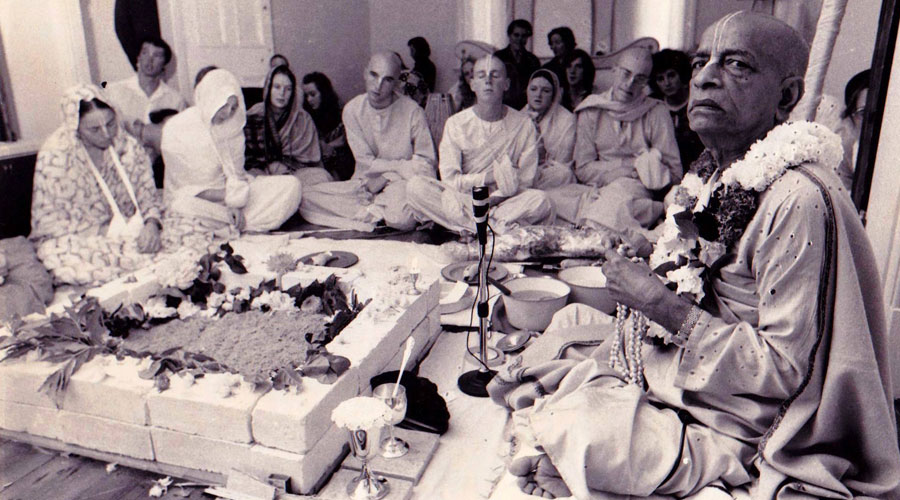What technically happens during initiation?
 Author: Ananda Vrindavan dasi
Author: Ananda Vrindavan dasi
In his purport to Caitanya Caritamrta (Madhya 24.256), he writes, “This is the process of initiation. The disciple must vow that he will no longer commit sinful activity — namely illicit sex, meat-eating, gambling, and intoxication. He promises to execute the order of the spiritual master. Then the spiritual master takes care of him and elevates him to spiritual emancipation.”
Initiation is the process that fills devotees with transcendental knowledge, frees them from sinful reactions, and blesses them with mantras that bring them closer to their spiritual master and Krishna. Initiation is not just a one-time ceremonial act; actually, it is only the beginning of a process. Therefore Srila Prabhupada uses the phrase “process of initiation.” In his purport to Caitanya Caritamrta (Madhya 24.256), he writes, “This is the process of initiation. The disciple must vow that he will no longer commit sinful activity — namely illicit sex, meat-eating, gambling, and intoxication. He promises to execute the order of the spiritual master. Then the spiritual master takes care of him and elevates him to spiritual emancipation.”
The process of initiation begins well before the formal ceremony. Before aspiring disciples make their vows, they should show steadiness in at least the external acts of devotion. For this, the scriptures recommend a testing period of one year. During that time, the spiritual master imparts sambandha-jnana, or the knowledge of the relationship with the Supreme Lord, to the aspiring disciple. He also makes sure that all aspirants have embraced this knowledge with proper faith. Disciples without a clear understanding of devotional principles, or with only a superficial understanding of transcendental knowledge, cannot free themselves from unwanted habits and offensive chanting, and consequently, they cannot steady themselves in devotional practice.
The process of initiation begins well before the formal ceremony. Before aspiring disciples make their vows, they should show steadiness in at least the external acts of devotion.
After the initiation ceremony, disciples should accept further training from their spiritual master. This training includes receiving a program of services to regulate the wandering mind and senses, as well as further instructions on how to perform devotional service in the ways most pleasing to Krishna. To provide such schooling, Srila Prabhupada introduced a strict schedule of a devotee’s prescribed duties, which would steady his followers by giving them the best opportunity to free themselves from unwanted habits and quickly advance further.
In conclusion, it is the duty of the spiritual master to give his disciples knowledge of the relationship, practice, and perfection (or sambandha, abhideya, and prayojana), and it is the duty of the disciple to embrace and apply these teachings. If they are neglectful of their duties, then both the guru and his disciples will, unfortunately, suffer the consequences of falling from their positions. Accepting disciples is no different from any other service in the sense that it must be done properly. However, if gurus and disciples perform their duties properly, they will both benefit and advance in Krishna’s service.
(Extract from Madhurya Kadambini course)
Sign Up For Bhaktivedanta College Newsletter. Be with us & join now.













Get Social